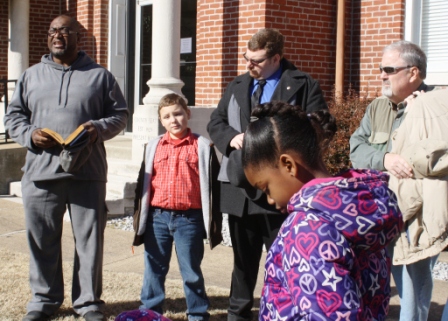(Clinton, KY January 20, 2014) - Moore's Chapel AME Church was the starting point for a prayer walk to the Hickman County Courthouse. After prayer, the walkers returned to the church for prayer, music and testimony.
Below, Tanner Dublin presented a sign language performance to hymn "It is Well With My Soul.

A reading from "Letter from Birmingham Jail" - Dr. Martin Luther King, Jr. August 1963
"...You express a great deal of anxiety over our willingness to break laws. This is certainly a legitimate concern.
Since we so diligently urge people to obey the Supreme Court's decision of 1954 outlawing segregation in the public schools, it is rather strange and paradoxical to find us consciously breaking laws. One may well ask, "How can you advocate breaking some laws and obeying others?"
The answer is found in the fact that there are two types of laws: there are just laws, and there are unjust laws. I would agree with St. Augustine that "An unjust law is no law at all."
Now, what is the difference between the two? How does one determine when a law is just or unjust? A just law is a man-made code that squares with the moral law, or the law of God. An unjust law is a code that is out of harmony with the moral law. To put it in the terms of St. Thomas Aquinas, an unjust law is a human law that is not rooted in eternal and natural law. Any law that uplifts human personality is just. Any law that degrades human personality is unjust. All segregation statutes are unjust because segregation distorts the soul and damages the personality. It gives the segregator a false sense of superiority and the segregated a false sense of inferiority.
To use the words of Martin Buber, the great Jewish philosopher, segregation substitutes an "I - it" relationship for the "I - thou" relationship and ends up relegating persons to the status of things. So segregation is not only politically, economically, and sociologically unsound, but it is morally wrong and sinful.
Paul Tillich has said that sin is separation. Isn't segregation an existential expression of man's tragic separation, an expression of his awful estrangement, his terrible sinfulness? So I can urge men to obey the 1954 decision of the Supreme Court because it is morally right, and I can urge them to disobey segregation ordinances because they are morally wrong. Let us turn to a more concrete example of just and unjust laws. An unjust law is a code that a majority inflicts on a minority that is not binding on itself. This is difference made legal. On the other hand, a just law is a code that a majority compels a minority to follow, and that it is willing to follow itself. This is sameness made legal....
Of course, there is nothing new about this kind of civil disobedience. It was seen sublimely in the refusal of Shadrach, Meshach, and Abednego to obey the laws of Nebuchadnezzar because a higher moral law was involved.
It was practiced superbly by the early Christians, who were willing to face hungry lions and the excruciating pain of chopping blocks before submitting to certain unjust laws of the Roman Empire. To a degree, academic freedom is a reality today because Socrates practiced civil disobedience.
We can never forget that everything Hitler did in Germany was "legal" and everything the Hungarian freedom fighters did in Hungary was "illegal." It was "illegal" to aid and comfort a Jew in Hitler's Germany. But I am sure that if I had lived in Germany during that time, I would have aided and comforted my Jewish brothers even though it was illegal.
If I lived in a Communist country today where certain principles dear to the Christian faith are suppressed, I believe I would openly advocate disobeying these anti-religious laws.
But as I continued to think about the matter, I gradually gained a bit of satisfaction from being considered an extremist.
Was not Jesus an extremist in love? -- "Love your enemies, bless them that curse you, pray for them that despitefully use you."
Was not Amos an extremist for justice? -- "Let justice roll down like waters and righteousness like a mighty stream."
Was not Paul an extremist for the gospel of Jesus Christ? -- "I bear in my body the marks of the Lord Jesus."
Was not Martin Luther an extremist? -- "Here I stand; I can do no other so help me God."
Was not John Bunyan an extremist? -- "I will stay in jail to the end of my days before I make a mockery of my conscience."
Was not Abraham Lincoln an extremist? -- "This nation cannot survive half / slave and half free."
Was not Thomas Jefferson an extremist? -- "We hold these truths to be self-evident, that all men are created equal."
So the question is not whether we will be extremist, but what kind of extremists we will be. Will we be extremists for hate, or will we be extremists for love?
Will we be extremists for the preservation of injustice, or will we be extremists for the cause of justice?..."
'








